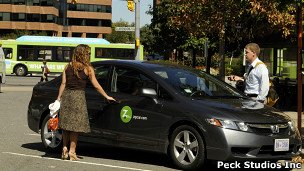Roberto Ruiz and Kyle Lewis do not have much in common. One is Mexican, doctor and lives in Miami; The other is an American, a commercial analyst, and lives in Virginia. But there is something that unites them: they are two young people in the United States who have decided not to have a car, a trend that has forced to react to the automotive industry.
The reasons Lewis and Ruiz, 27 and 28, are similar. They both wanted a change after spending two or three hours a day behind the wheel in the past. Both discovered the possibility of saving money and both have other interests that they consider more priority.
And they are not alone.
According to the Federal Motorway Administration, young people between the ages of 21 and 30 drove 12% less in 2009 than their counterparts in 1995.
Less licenses were issued, according to the Department of Transportation. While half of 16 year olds were licensed in 1978, in 2008 the figure was 31%. The number of people aged 19 or under licensed also decreased when comparing the same period.
"Among those who came of age in the 50s or 60s, buying a car was very important. It was the rite of initiation into adulthood, the icon of freedom and independence," Sheryl Connelly told BBC World. , The director of global trends and forecasts for Ford.
"But the car is no longer that rite of initiation," he says.
Why the change?
Money and technology
Old Car
In previous decades, the young man with the most "cool" car was the most envied.
Connelly explains that the new symbol of independence, the iconic purchase, is no longer the car but the cell phone. And it competes with tablets, consoles and laptops.
"These handheld devices literally transcend time and space. Using cell phones, texting, Skype, Twitter and Facebook have allowed people to feel virtually together so they are physically separated," he says.
In a survey of technology research firm Gartner, 46% of respondents aged 18-24 said they preferred to have internet access to their own car. The percentage is 15% when asked who grew up in the 50s and 60s, considered the golden age of American motorsport.
But technology is not the only reason.
On the one hand, young people tend to live in large cities, where there may be more transportation facilities and alternative options. For example, some cities offer shared cars and rental bikes.
On the other hand, the requirements to acquire a license have become more difficult and the gradual license was introduced, which obliges the youngest to be accompanied by a driver aged 21 or over for some time until they gain experience at the wheel.
Another problem is the economy.
Click to read Also: Resurrection of buses in the United States
Debt, Debt and Debt
Kyle Lewis
Kyle Lewis participated in an Arlington County Contest to leave the car. He now has a blog where he explains what it's like to live in America without a car.
A February 2012 report from the Pew Research Center explains that young adults, more than other population groups, are having more problems in today's economy.
The percentage of adults between 18 and 24 who are employed is the lowest since the government began taking measurements in 1948. In addition, their weekly wages have declined more than the other groups in the past five years.
The picture is complicated when it is also taken into account that many young people have debts since when they start their career, as with student loans.
Click Read also: student loans in the US: the next bubble?
This economic situation, according to Pew, affects both their daily lives and their plans for the future. It is no secret that having a car generates expenses from insurance, which is usually more expensive for young people, even gasoline, which is already around US $ 4 per gallon.
In that sense, Roberto Ruiz estimates that having no car saves 30% of his monthly salary, while Kyle Lewis saves US $ 600 a month.
In fact, some analysts are not very sure that the reduction in young people's interest in cars is a trend, and rather believe that it is a result of economic difficulties.
Zipcar
An alternative to having your own car are the cars to share, called Zipcar, that are available in some cities.
"This can simply be a reflection of poor economic times and the inability of young people to buy a car," JH Crawford, a writer and activist for car-free cities, told BBC World.
"I would like to believe that there is a philosophical support, but I do not want to say that this is the truth."


more room on the road for me then lol :)
resteeming for you too, Welcome, if you have any questions feel free, ask away here or in the chat-rooms, if you have used the material from another source, cite that and leave a link, apart from that Cheers welcome and good luck :)
Cars are too expensive for most young people.